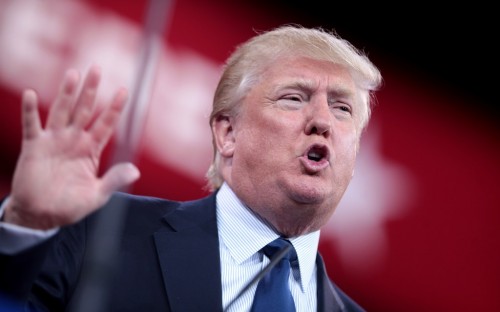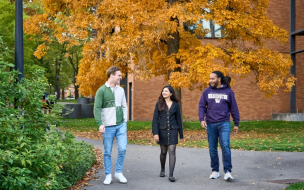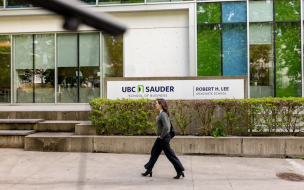Candidates fear they will not get H-1B visas, which enable them to work in the US upon graduating
Business school applicants are planning to shun US business schools because of Donald Trump’s immigration policies. More than 21% of candidates indicated they agree that Trump’s immigration policies have impacted them, and that they will only apply to schools outside the US, in an annual survey by Stacy Blackman Consulting, an admissions firm.
The survey also found that more than 80% of applicants agree that Trump’s stance on immigration will reduce the diversity of US business schools. The survey was conducted during spring of this year, with 755 respondents.
The data are the latest indication that MBA candidates are both put off US business schools by Trump’s hardening outlook on immigration, and that schools outside of the US may benefit from that trend.
Trump this month controversially promised to cut immigration in half during his presidency, although the legislation is likely to prioritise education and skills.
Nevertheless, such policies appear to have pushed some candidates to countries that are viewed as being more welcoming of international students, and which have more progressive immigration policies, such as Canada and some continental European nations.
The Stacy Blackman Consulting survey confirms previous research into the negative impact Trump is having on US business schools. Nearly two-thirds of MBA programs there have seen a fall in applications from international candidates, according to a recent survey of 300 business schools by the Graduate Management Admissions Council (GMAC). More than 40% of non-US MBA candidates said they were less likely to apply to US courses because of Trump’s election.
US business schools rely heavily on overseas students to fill their MBA courses, with the added diversity enriching their classrooms.
The biggest concern among applicants seems to be that Trump will clamp down on work visas, making it more difficult for them to stay in the US after graduating — a key reason for studying there. This is beginning to effect Indian MBA applicants in particular, with more than 80% of them telling GMAC the need to get a job in their host country was “very important”.
However, a separate survey from GMAC in June found that 55% of US companies either plan to hire or are open to hiring an international candidate in 2017 — up from 49% that had such plans last year.
Yet that does not mean they will be able to do so. There is an annual quota of 85,000 H-1B visas — how most foreign MBAs are hired in the US — and that was breached this year in just four days.
US business schools in the middle of prominent MBA rankings are likely to suffer the most. GMAC found the biggest falls in international students applying to US schools were in the midwest of the US. In the northeast and on the west coast, where most of the top-ranked MBAs are, the fall in application numbers was not as bad.
Many highly-ranked US business schools can rely on their strong brands, and other factors, to attract international MBA candidates, and many have reported rises in applications this year. At NYU Stern applications are up by 4%.
Student Reviews
New York University - Leonard N. Stern School of Business
What built my love for NYU
My involvement with NYU has been astonishing thanks to individuals there, yet I truly do figure they could improve in the area of offering understudies sage monetary guidance. I only have more inquiries in regards to my school consistently. I truly like how different and comprehensive my school is generally speaking. By and large, individuals are thoughtful, well disposed, and exceptionally splendid. I'm propelled to work harder by my incredible speakers and companions. Assets and encounters are unparalleled. In spite of the fact that it isn't a great fit for everybody, I love going to a major metropolitan school. The main things I need were that it was more affordable and farther away from my folks.
Experienced educators
NYU is known for its focus on providing students with hands-on experiences. They offer numerous opportunities for exploration. The classes are enjoyable, and the professors display genuine passion for both their subjects and their students. The professors at NYU are highly knowledgeable in their fields and are always available to lend a helping hand as long as you make the effort to approach them. Joining a research laboratory is highly encouraged and can provide you with priceless experience. The professors not only care for students but are also highly intelligent. They prioritize the success of their students in their future careers.
Graduate Acting in a Nutshell
NYU's Graduate Acting program has consistently been recognized in the world's top 5 acting graduate programs for years. With an unprecedented pandemic commencing in my first year in the program, I experienced the type of innovation worthy of that world recognition. The ability to pivot entirely, yet maintain an extremely high level of education was truly profound. I consistently found myself being pushed in ways I wasn't aware I needed to be. The access to industry professionals for advice, guidance, and leadership means the transition after graduation is much less daunting than going it alone.
Simply the best school
This school is truly outstanding. In essence, there is no other educational institution that can surpass its exceptional performance and unparalleled attention to detail. It not only boasts state-of-the-art equipment, but also houses exceptional professors who are available to guide and instruct students on their usage.
Quality curriculum
NYU is a wonderful school where you can really learn anything you want to know. New York College gives probably the best training inside a city climate. I can see NYU becoming a leader in the technology and infrastructure industries thanks to its rapidly expanding engineering school. I love the delightful way proficient the teachers are and how the educational plan is set up.
Amazing school environment
The campus of New York University is very diverse, has excellent programs, and the professors are nice. NYU's location is fantastic because it is close to Manhattan. There is so much to learn about and such a lively environment created by the city. Additionally, I believe that the urban location of the campus aids students in developing important life skills.
Transformative experience
The experience of going to New York University (NYU) has been transformational. An environment that is conducive to study is created by the lively campus and multicultural community. NYU provides a comprehensive education that goes beyond the classroom thanks to the access to limitless opportunities in the center of New York City. The student experience is further improved by the support services and extracurricular activities. I wholeheartedly endorse NYU as a fantastic university.
This programe was strong!
The studies we're great, I learned the ins & outs of modern history. The subjects taught were on point (biology, art, etc.)
The staff was well trained and were very helpful and kind. Facilities were also on point.
The pricing can be a bit expensive though, but it is worse in Massachusetts.
NYU's Undergrad Accounting
The Stern School of Business provides the undergraduate accounting program at New York University. Students are prepared for careers in accounting, finance, and related fields through this highly regarded program. In addition to a comprehensive business education, the program provides students with a solid foundation in accounting principles.
The educational program remembers courses for monetary bookkeeping, administrative bookkeeping, tax collection, evaluating, and data frameworks. Economics, statistics, finance, and management are also required courses for students.
Through internships and other experiential learning opportunities, students have the opportunity to gain practical experience in addition to the coursework. Additionally, the program has strong connections to leading accounting firms, which may offer students a route to employment opportunities after graduation.
By and large, the undergrad bookkeeping program at New York College is a thorough and extensive program that can give understudies the abilities and information they need to prevail in the field of bookkeeping.
Journalism program
The best professors!!!! Really talented and experienced, full of knowledge and gave really a hands on education. We worked like a real newsroom, got assigned stories and were given the tools to go after them.
The student life
Best: The university offers excellent courses that are highly ranked, with experienced and knowledgeable lecturers. Student life is vibrant, with plenty of study spaces, and some buildings are modern and built to a high standard.
Worst: Some buildings are in poor condition, including mine, which is in serious need of an upgrade. For instance, a decaying rat has been stuck in the pipes for weeks, causing a terrible smell throughout the downstairs area. There are very few food and drink options—only vending machines, which are often out of order. Additionally, the university lacks a centralized campus, as buildings are scattered across the city, making navigation less convenient.
Best: The university offers excellent courses that are highly ranked, with experienced and knowledgeable lecturers. Student life is vibrant, with plenty of study spaces, and some buildings are modern and built to a high standard.
Worst: Some buildings are in poor condition, including mine (Redwood Building), which is in serious need of an upgrade. For instance, a decaying rat has been stuck in the pipes for weeks, causing a terrible smell throughout the downstairs area. There are very few food and drink options—only vending machines, which are often out of order. Additionally, the university lacks a centralized campus, as buildings are scattered across the city, making navigation less convenient.








